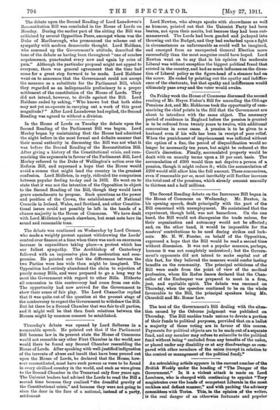In the House of Lords on Tuesday the debate upon
the Second Reading of the Parliament Bill was begun. Lord Morley began by maintaining that the House had admitted the night before in the most formal and definite manner that their moral authority in discussing the Bill was not what it was before the Second Reading of the Reconstitution Bill. After giving a history of the Constitutional crisis, and sum- marizing the arguments in favour of the Parliament Bill, Lord Morley referred to the Duke of Wellington's action over the Reform Bill, and expressed a hope that the House would avoid a course that might land the country in the greatest confusion. Lord Midleton, in reply, ridiculed the comparison between popular feeling to-day and in 1832. He went on to state that it was not the intention of the Opposition to object to the Second Reading of the Bill, though they would have grave amendments to propose. Such questions as the power and position of the Crown, the establishment of National Councils in Ireland, Wales, and Scotland, and other Constitu- tional issues could not possibly be left in the hands of a chance majority in the House of Commons. We have dealt with Lord Midleton's speech elsewhere, but must note here its sound and reasonable tone.










































 Previous page
Previous page